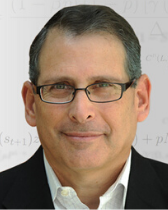Faculty Spotlight: Martin Eichenbaum

Q&A with Professor Martin Eichenbaum Regarding His COVID-19 Research, Including His Article, “The Macroeconomics of Epidemics.”
The COVID-19 pandemic has had far-reaching consequences beyond the spread of the disease itself and efforts to quarantine it. Our faculty members have been hard at work publishing new research to better understand the economic impacts. One of our faculty members at the forefront of COVID research is Martin Eichenbaum. Eichenbaum, along with co-authors, Sergio Rebelo and Mathias Trabandt, has been working on a series of papers discussing the idea of "smart containment," including a recent paper titled, "The Macroeconomics of Epidemics." (Source)
In your paper “The Macroeconomics of Epidemics,” you discuss what you call, “smart containment.” Can you explain the premise behind this concept? Is “smart containment” still our best option?
Eichenbaum: Most governments responded initially to the COVID-19 crisis by implementing simple measures to contain the epidemic. These measures do not treat people differently on the basis of their health status. These simple containment measures imply a sharp, negative tradeoff between the level of economic activity and the health consequences of an epidemic. While brute force is beneficial from a health perspective, simple containment measures are not politically sustainable. It is critical that we design policies that improve the tradeoff between economic activity and health outcomes. Mandatory masks and measures to protect the old are obvious examples of such policies. Less obviously, smart containment policies that combine testing and quarantines dramatically improve the trade-off. That is the key takeaway from a series of papers that I have written with co-authors, Sergio Rebelo and Mathias Trabandt.
The key to “smart containment” is that infected people do not work and minimize public consumption. This policy means that people who are not infected with COVID-19 can work and consume without the risk of becoming infected. As a result, the economy does not suffer in any meaningful way from a recession. Moreover, the overall death toll of the epidemic is very small, with the number of infected people declining monotonically from its initial level to zero.
While expensive, smart containment is still our best option and will remain so until we have widespread effective vaccines. The longer policymakers take to implement containment measures, the more severe the recession will be, and the more people will die.
Now that many states are moving on to phases three and four with many restrictions being lifted, do you think the economy is stable enough to take another potential shut down if there is a second wave? Do you think a second shut down will happen?
Eichenbaum: We are already in a second wave of infections. Unfortunately, that means tragic health outcomes. The data already indicates a reversal of what was an incipient economic recovery, both because of new shutdowns and the rational response of people to cut back on market activity.
How does COVID-19 affect how we think about work and higher education?
Eichenbaum: We were already moving slowly to another “equilibrium” in which online interactions would play a much larger role in work and higher education. The pandemic has forced us to move much more quickly to that equilibrium. The short-run adjustment will be costly, but I believe we will get to a better place. Once effective vaccines are widely available, we can do in person what is best done in person and do online what is best done online. The net result will be an outcome that is better for people and the environment.
What do you think American unemployment will look like moving forward?
Eichenbaum: We are in for a brutal persistent recession. In June, the IMF forecasted an 8% decline in real GDP, with only a modest recovery in 2021. I would not rule out the unemployment rate hovering around 10% for the next year, with no return to the pre-COVID-19 unemployment level for years.
